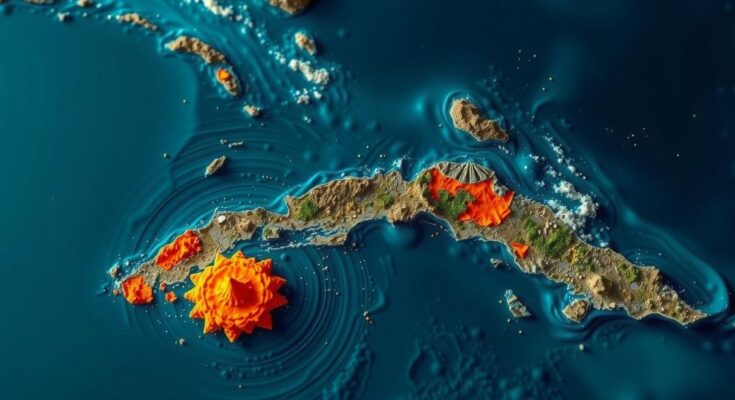Eastern Cuba was shaken by a 6.8 magnitude earthquake, along with additional tremors, following a challenging period marked by hurricanes and power outages. The seismic activity, felt in major cities, raised concerns among residents but did not result in significant injuries or damages. Recent events reflect the ongoing difficulties as Cuba grapples with natural disasters and public discontent.
On Sunday, eastern Cuba experienced significant seismic activity, with a 6.8 magnitude quake occurring near Pilon, accompanied by tremors of 5.9 and 4.6 magnitudes. The United States Geological Survey (USGS) reported that the epicenter was situated approximately 25 miles (40 km) south of Bartolomé Masó. The vibrations were felt across eastern Cuba, including major urban centers such as Santiago de Cuba, but there were no immediate reports of damages or injuries, despite residents expressing their alarm. In Santiago, individuals like 76-year-old Yolanda Tabío described the chaos as the quakes caused buildings to sway. “You had to see how everything was moving, the walls, everything,” she recounted. Following the quakes, several smaller tremors were recorded near Puerto Rico within a 24-hour timeframe, prompting concerns among local residents. Miami authorities clarified that there were no seismic effects detected across South Florida. These earthquakes arrive in the wake of severe weather challenges faced by Cuba, which has been grappling with hurricanes and extensive power outages. Recently, Hurricane Rafael hit western Cuba, resulting in widespread damage and power loss. The island has endured ongoing energy crises leading to extended blackouts, which have driven an increase in public discontent and subsequent protests across various regions.
The seismic events off the south coast of Cuba reflect a region frequently subject to geological activity due to its location along tectonic plate boundaries. Recent weeks have been particularly challenging for the island, with natural disasters compounding the difficulties faced by its residents, including hurricanes that have led to significant infrastructural damage and power outages. Public dissatisfaction has been exacerbated due to the ongoing energy crisis, leading to protests, as citizens struggle to cope with the compounded effects of these calamities.
In summary, the multiple earthquakes off the south coast of Cuba mark a significant geological event amidst ongoing natural and societal challenges for the island nation. While immediate damage appears limited, the combination of seismic activity and the aftermath of recent hurricanes accentuates the vulnerabilities of Cuba and the urgent need for resilience and support in facing these adversities.
Original Source: www.cbsnews.com




